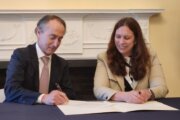LONDON — The alarm was first raised in December. That’s when Matt Hancock, the United Kingdom’s health secretary, announced that a new, highly infectious variant of the novel coronavirus that causes COVID-19 was sweeping across Britain. It’s now known that the so-called U.K. variant, labeled B.1.1.7 by researchers, is up to 30% to 50% more transmissible than earlier strains.
Since then, the new variant has indeed caused a surge in cases in Britain and quickly spread around the world. It’s been found in at least 82 countries, and the Centers for Disease Control and Prevention (CDC) predicts the strain will dominate American cases by March.
But forewarned is forearmed. And thanks to Britain’s head’s up, government and health officials worldwide were at least given a chance to prepare for B.1.1.7’s scary emergence.
[MORE: Countries and Territories Without Reported COVID-19 Cases]
U.K. health authorities didn’t just stumble upon the new strain by accident, however. They were looking for it. That’s because last March a handful of pathogen genome experts persuaded public and private agencies to pony up £20 million ($28 million) to create the COVID-19 Genomics UK Consortium (COG-UK) to sequence the genes of randomly collected samples of the virus taken from infected patients. The idea was to track mutations in the construction of the virus in near real time — mainly to determine if it was evolving in ways that could either help it bypass natural or vaccine-induced immunity or become more transmissible.
“Being able to spot mutations and respond to them, that is where our main success could be,” the researchers decided, explains Sharon Peacock, COG-UK’s director and a professor of public health and microbiology at the University of Cambridge.
As it happens, Britain was the only country to put together a team to systemically conduct genomic sequencing of SARS-CoV-2, the scientific name for the coronavirus, and as such it’s become the world leader in the hunt for mutations. COG-UK has contributed nearly half of the sequence data within GISAID, a large open-access database used by researchers worldwide.
“I am surprised” that other countries didn’t set up anything similar, Peacock says, “but that’s not a criticism.”
Manuel Schibler and Samuel Cordey, of the Geneva University Hospitals’ Laboratory of Virology, say it was a good idea to follow the genomic variances of the virus. But Schibler, a clinician, says it’s understandable that no other countries initially followed COG-UK’s lead. “It’s quite expensive to do,” he says. Peacock agrees that the process is costly, and stresses that nearly all of the funding — which came from government agencies and the Wellcome Sanger Institute, a nonprofit health care research group — is spent on sequencing. All staffers are volunteers, and universities are donating lab space and equipment.
But Britain’s discovery of B.1.1.7 has since prompted other countries to follow COG-UK’s lead. “This is clearly in response to the discovery of the U.K. variant in December,” says Cordey, a researcher.
Officials in Denmark, for example, are so worried about B.1.1.7’s ability to aggressively spread at lightning speed that they’ve commenced a major effort to sequence every positive COVID-19 test to try to ensure no dangerous mutations escape notice. In the United States, the CDC said last week it would spend $200 million in an effort to sequence 25,000 genomes a week. But Democratic lawmakers want to include $1.75 billion for COVID-19 sequencing in the Biden administration’s economic relief package that’s expected to pass Congress next month.
COG-UK’s effort to use genetic surveillance of COVID-19’s mutations is perhaps one of only two success stories in Britain’s battle to end the pandemic, the other being its so-far smooth and fairly rapid rollout of vaccines. The U.K. has one of the world’s highest per capita death rates from COVID-19: as of Feb. 22, it’s recorded more than 121,000 deaths, and 41.2 million cases. Prime Minister Boris Johnson’s Conservative government has faced harsh criticism from public-health experts for mishandling the pandemic, ranging from being too slow to implement lockdowns to bombarding the public with confusing messaging to spending millions of pounds on a test-and-trace program that remains rickety at best. But thanks to an ongoing national lockdown that’s led to a decline in case numbers, as well as the vaccine program, Johnson has seen a small uptick in his approval ratings.
When Peacock and her fellow researchers got the idea for COG-UK in late March, it was still early days in the pandemic — the U.K. had only 84 confirmed cases of the coronavirus at the time. They met and mapped out a blueprint for how they would do it and had a proposal ready to present the government within a day. And she credits the government for quickly recognizing the plan’s worthiness, approving it and making funding immediately available.
“In a nutshell, a group of people got together and decided this was going to be increasingly important to the future, way back in March,” she explains. There was a touch of fortuitous circumstances involved, however, because the U.K. just happens to be home to a sizable number of researchers with expertise in the public-health applications of sequencing, particularly during the Ebola virus epidemic that struck West Africa from 2014-2016.
Admittedly, there were some skeptics within the group who felt it wasn’t worth the effort because coronaviruses tend not to mutate as much as many other viruses. But in the end, the proponents won out.
“Not only did we have a track record of doing it and were convinced of its value,” Peacock says, “but there was a group of people who were really enthusiasts about this.”
On average, COG-UK randomly selects and sequences roughly 10% of samples from confirmed cases, though that percentage waxes and wanes depending on whether cases are rising or falling. Currently, it’s sequencing nearly 20,000 genomes a week, and plans to further increase that rate in the coming weeks. “This gives us a very strong representation of what’s out there,” she says.
[MORE: What Iceland Can Teach the World About Minimizing the Coronavirus]
The consortium has four main things it’s looking out for: whether a mutation makes the virus more transmissible, or helps it evade natural or vaccine-induced immunity, or makes it more lethal, or renders it harder to diagnose. The mutation on the U.K. variant that the team spotted is on the virus’ spike protein, which it uses to invade healthy cells. Some researchers think that the mutation makes it more transmissible than earlier strains because it enables higher levels of the virus to take hold in the upper respiratory tract. So far, Peacock says, there’s no evidence that the B.1.1.7 mutation can evade vaccines. Nor is there any evidence that the virus is harder to diagnose.
Initially, she and other experts said there was no indication that it was more lethal than previous iterations of the virus. But now U.K. government scientists are warning that it is “likely” that B.1.1.7 may be slightly more deadly than earlier variations.
Peacock says studies indicating that B.1.1.7 may be more lethal call for an “urgent investigation” to see if they hold up. “But further evidence is needed before it is possible to be certain that there is a direct cause-and-effect link between infection with B.1.1.7 and a higher risk of death.” Public health experts also say that even if the U.K. variant does slightly increase mortality, the bigger risk is its undoubted higher rate of transmissibility, because many more cases would almost certainly cause many more deaths and further over-extend already jam-packed hospitals.
Peacock stresses that the main reason COG-UK was needed “was to build something to support a vaccination program,” by giving vaccine manufacturers quick notice of immunity-dodging mutations so that they can rapidly tweak their vaccines and keep them effective.
“And I predict that’s what we are going to have to do,” Peacock says. “It’s going to be a cat and mouse game.”
Earlier last year, COG-UK spotted some other mutations that made the virus slightly more contagious. “But when the B.1.1.7 variant hit, it was so much more transmissible, I think the world woke up.”
Nevertheless, she adds, other variants now popping up around the globeal — in particular, 501.V2, first found in South Africa; and P.1, which was first detected in Brazil — are much more important biologically than B.1.1.7. That is because they have a combination of two mutations that leads to rapid transmissions and may also challenge immune response. Indeed, the latest research shows that approved vaccines are somewhat less effective against the South African variant and drugmakers are already working to upgrade their vaccines to account for that.
While the discovery of B.1.1.7 shone the spotlight of publicity on COG-UK’s work, Peacock insists it isn’t the consortium’s main accomplishment. Instead, she notes that her team has invented sequencing technologies and protocols that other researchers around the world are now using, and also created open-access analytical software that’s also in wide use.
“I think our biggest achievement is providing a platform for everyone else.” And, Peacock predicts, in the coming year, because many other countries will be keeping a continuous watchful eye on COVID-19’s mutations, “bigger discoveries will be made.” And that should help keep us one step ahead of an ever-evolving virus, and ultimately contain it.
This story has been supported by the Solutions Journalism Network, a nonprofit organization dedicated to rigorous and compelling reporting about responses to social problems.
More from U.S. News
Countries Without Reported COVID-19 Cases
Government Support Needed to Drive Global Economic Recovery, IMF Says
The 25 Best Countries in the World
Early Action by British Scientists Helped Detect COVID-19 Mutations originally appeared on usnews.com






